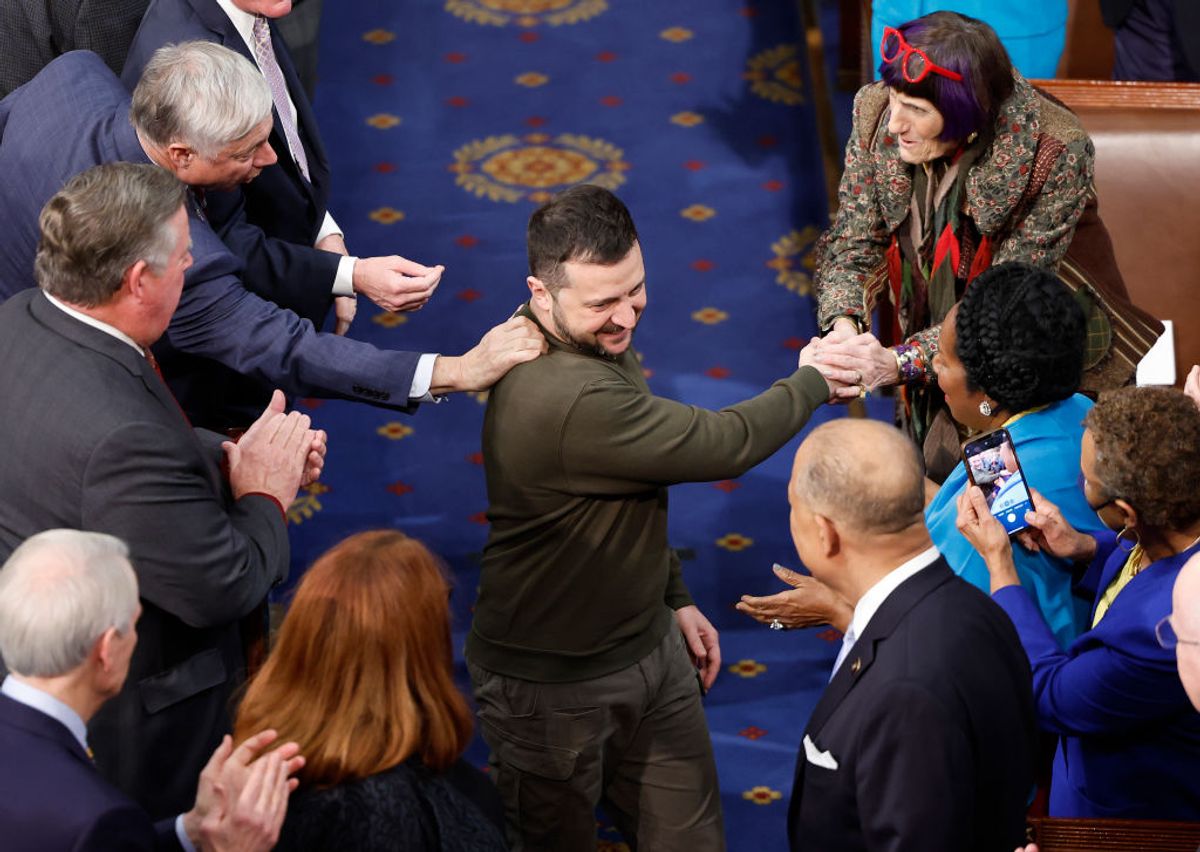In late September 2023, with a deadline to fund the operation of the U.S. government fast approaching, a new talking point emerged from those opposed to continued U.S. financial support for Ukraine against Russian aggression — that the government cares more about paying the salaries of Ukrainians than it does Americans.
If Congress cannot pass a resolution that funds the operation of the government by the end of September, its nonessential functions will shut down, workers will be furloughed, and paychecks will be withheld until the government is reopened.
According to a Sept. 25, 2023, Newsweek article (that was later echoed by ZeroHedge and Infowars), such an event would not stop the payment of salaries for some Ukrainian workers:
A federal government shut down will effectively begin on October 1 if Congress isn't able to pass a funding plan that Biden signs into law. If that happens, federal agencies have to stop all nonessential work and will not send paychecks for as long as the shutdown lasts. [...]
That would create a situation where U.S. federal employees will be waiting on paychecks, while U.S. taxpayer money will be paying the salaries of Ukrainians. U.S. aid is being used to pay the salaries of all of Ukraine's first responders, according to a recent report by 60 Minutes.
Other political influencers ran with the talking point presented by Newsweek, as well:
JUST IN: The United States will pay Ukrainian salaries but furlough American citizens in the impending government shutdown.
Your government hates you and loves war.
If Congress fails to pass a spending plan, the U.S. government will shut down at the end of the month but will… pic.twitter.com/qBlN2RuSwe
— Collin Rugg (@CollinRugg) September 25, 2023
Broadly speaking, it is true that money committed to Ukraine by the United States (and other entities) to pay the salaries of Ukrainian first responders and other civil servants would continue even in the event of a U.S. government shutdown. There are two key reasons this is the case:
First, the Ukraine money, through four separate bipartisan acts of Congress, had already been appropriated for this use. As described in a January 2023 Congressional Research Service (CRS) briefing, the funds were already made available to the Ukrainian government:
In 2022, Congress enacted four emergency supplemental funding measures to address the crisis caused by Russia's February 2022 invasion of Ukraine. [...] As of January 1, 2023, Congress has appropriated a total of $113 billion in FY2022 and FY2023 in response to Russia's war against Ukraine.
Second, as mandated by those same bipartisan acts of congress, the U.S. is providing this money through an intermediary fund overseen by the World Bank, an institution that would operate regardless of the existence of congressionally approved funding for the United States government, as described in that same CRS report:
To date, the U.S. Agency for International Development (USAID) has obligated $22.9 billion of the appropriated funding for direct financial support for the Government of Ukraine's (GOU's) central budget. The agency has provided such support via three World Bank mechanisms, rather than bilaterally.
Further, it is misleading to suggest, as ZeroHedge does, that the "60 minutes" news program cited above had "uncovered" the fact that the United States was funding the salaries of Ukrainian first responders and other public workers. That's because the information is explicitly stated in bills authorizing money for Ukraine and in several of USAID's news releases going back to 2022.
Sec. 1705. of the Consolidated Appropriations Act for the year 2023, which provides substantial financial support for Ukraine, states that "funds appropriated by this title may be made available for direct financial support for the Government of Ukraine, including for Ukrainian first responders." A USAID news release from February 2023 reads:
In April 2022, USAID provided the first tranche of U.S. direct budget support to the GoU. Since then, we have provided a total of $13 billion in budget support. This funding has helped the GoU pay the salaries of 618,000 educators, 517,000 health workers, and 56,500 first responders.
A June 2023 report updated the figures above to $22.9 billion in funding. It simply was not "uncovered" news in September 2023 that 57,000 first responders' salaries in Ukraine were being reimbursed by the U.S. government when news releases stated this fact in July 2022.
If the U.S. government shuts down, American civil servants will, indeed, suffer a pause in paychecks that will have been caused by a lack of action in the present congressional session. The fact that Ukrainian workers will get paid during this time period is thanks, however, to congressional action in previous sessions of Congress.
